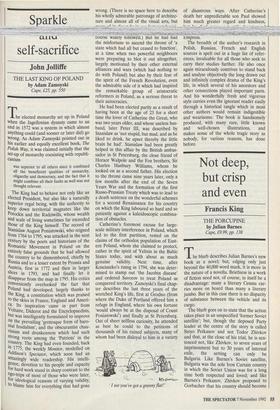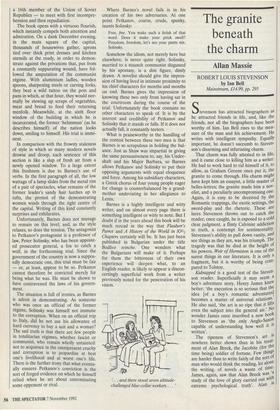Not deep, but crisp and even
Francis King
THE PORCUPINE by Julian Barnes Cape, £9.99, pp. 138 The blurb describes Julian Barnes's new book as a novel; but, edging only just beyond the 40,000 word mark, it is more in the nature of a novella. Briefness in a work of fiction need not, of course, in itself be a disadvantage: many a literary Cessna car- ries more on board than many a literary jumbo. But in this case there is no disparity of substance between the vehicle and its cargo. .
The blurb goes on to state that the action takes place in an unspecified 'former Soviet satellite'; but, though the deposed Party leader at the centre of the story is called Stoyo Petkanov and not Todor Zhivkov and that, at the close of his trial, he is sen- tenced not, like Zhivkov, to seven years of imprisonment but to 30 years of internal exile, the setting can only be Bulgaria. Like Barnes's Soviet satellite, Bulgaria was the sole Iron Curtain country in which the Soviet Union was for a long time both respected and loved; and like Barnes's Petkanov, Zhivkov proposed to Gorbachev that his country should become a 16th member of the Union of Soviet Republics — to meet with first incompre- hension and then repudiation.
The book opens with a virtuoso flourish, which instantly compels both attention and admiration. On a dank December evening, in the main square of the capital, thousands of housewives gather, aprons tied over thick print dresses and kitchen utensils at the ready, in order to demon- strate against the privations that, pus from a constantly suppurating wound, have fol- lowed the amputation of the communist regime. With aluminium ladles, wooden spoons, sharpening steels or carving forks, they beat a wild tattoo on the pots and pans in which, at that hour, they would nor- mally be stewing up scraps of vegetables, meat and bread to feed their returning menfolk. Meanwhile, at the sixth floor window of the building in which he is incarcerated, the former 'helmsman' (as he describes himself) of the nation looks down, smiling to himself. His trial is immi- nent.
In comparison with the frowsty staleness of style in which so many modern novels drowse and droop, each sentence of this section is like a slap of fresh air from a newly opened window. To a large extent this freshness is due to Barnes's use of verbs. In the first paragraph of all, the low wattage of a lamp slides from the metal rim of a pair of spectacles, what remains of the former leader's sandy hair lurches up in tufts, the protest of the demonstrating women winds through the tight centre of the capital. Writing of this kind constantly surprises and exhilarates.
Unfortunately, Barnes does not manage to remain on this level; and, as the style relaxes, so does the tension. The antagonist to Petkanov's protagonist is a professor of law, Peter Solinsky, who has been appoint- ed prosecutor general, a fox to catch a wolf, in the forthcoming trial. Since the government of the country is now a suppos- edly democratic one, this trial must be fair — or, at least, appear to be so. Petkanov cannot therefore be convicted merely for being what he was. He must be shown to have contravened the laws of his govern- ment.
The situation is full of ironies, as Barnes is adroit in demonstrating. As someone who was once an official of the former regime, Solinsky was himself not immune to the corruption. When on an official trip to Italy, did he not use his allowance of hard currency to buy a suit and a woman? The sad truth is that there are few people in totalitarian regimes, whether fascist or communist,. who remain wholly untainted: not to acquiesce in the omnipresent cruelty and corruption is to jeopardise at best one's livelihood and at worst one's life. There is the further irony that what eventu- ally ensures Petkanov's conviction is the sort of forged evidence on which he himself relied when he set about exterminating some opponent or rival. Where Barnes's novel fails is in his creation of his two adversaries. At one point Petkanov, coarse, crude, spunky, taunts Solinsky:
Free, free. You make such a fetish of that word. Does it make your prick swell? Freedom, freedom, let's see your pants stir, Solinsky.
Somehow the idiom, not merely here but elsewhere, is never quite right. Solinsky, married to a staunch communist disgusted by his apostasy, is a dim figure, dimly drawn. A novelist should give the impres- sion of having lived in intimate proximity to his chief characters for months and months on end. Barnes gives the impression of knowing these two only from having sat in the courtroom during the course of the trial. Unfortunately the book contains no other characters to speak of. It is by the interest and credibility of Petkanov and Solinsky that it stands or falls. If it does not actually fall, it constantly teeters.
What is praiseworthy in the handling of the contest between these two men is that Barnes is so scrupulous in holding the bal- ance. Just as Shaw was impartial in giving the same persuasiveness to, say, his Under- shaft and his Major Barbara, so Barnes allows Petkanov and Solinsky to put their opposing arguments with equal eloquence and force. Among his subsidiary characters, a Greek chorus of four young people eager for change is counterbalanced by a grand- mother undeviating in her allegiance to Lenin.
Barnes is a highly intelligent and witty writer, and on almost every page there is something intelligent or witty to note. But I doubt if in the years ahead this book will be much reread in the way that Flaubert's Parrot and A History of the World in 101Z2 Chapters certainly will be. It has just been published in Bulgarian under the title Bodlivo svinche. One wonders what the Bulgarians will make of it. Perhaps for them the bitterness of their own experience will deepen what, to an English reader, is likely to appear a discon- certingly superficial work from a writer previously noted for the penetration of his vision.
. . and there stood seven altitude- challenged blue-collar workers . . . '











































































 Previous page
Previous page